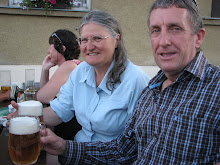The border crossing was a dusty wind-blown place. There were queues of trucks on both sides of the border and a brand new covered building stood unused on the Syrian side. We had to stand in the wind outside a small shed, filling in forms that wanted to know our mothers' and fathers' name, then we had to go to another shed that was the bank where we had to pay $60US for a Syrian visa.

The customs guy told us the bus station was 1 and a half kilometres away so we started to walk. A man in a mini van picked us up and dropped us at the station, which was a long way away. There was no bus so we had to take a mini van to Raqqaq, to join the main bus route.
Once inside the Raqqa bus station, we were besieged by about 10 different men yelling at us to take a bus from their company. It is such a crazy system. You have to find out from each, what time they are going, how much, work out who will leave next, and then find one that is the price you want to pay or with a company that has reasonable buses. They grab at you and shake their heads and wave their arms around and we have to decipher what they mean by all these gestures, yes, no, maybe, never! We were the only people at the station and no sooner had we got into the bus when small groups of people arrived to join us. They come a few minutes before the bus is ready to leave and before too long the bus was full and on its way.
We finally got on a comfortable bus to Aleppo and drove through a dust storm. All around was sand and rubbish blew every where. The fruit trees had them stuck on their branches and they were tangled in the vegetables. Rubbish is dumped any where, especially black plastic bags.
We drove past irrigated fields of wheat and there were people camped in the fields under tents made from plastic bags and scraps of material. They were grazing their sheep and goats on the edges of the fields and the sides of the road.
On the edge of Aleppo's old town we found a lovely spotless hotel. It used to be run by a 97 year old lady who had died 4 months before. We met Akhmet who ran the desk at night. He came from a Kurdish family in the north and at 28 wanted to marry. He has been studying archaeology for 5 years as well as working in the hotel. He sends money home to his dad who invests it in animals for his dowry. He currently has 7 sheep, 5 hens and a donkey but is still having difficulty finding a wife.
 Akhmet
AkhmetIt was raining and very cold on our first day so we spent it at the local museum. The most interesting display was the almost complete skeleton of a two year old found in a cave and estimated to be from between 40,000 and 200,000 years BC.
 Citadel
CitadelAleppo is a dirty, noisy, crowded city. The old city has many narrow lanes that have renovated houses in them that are now cafes, restaurants or hotels but they are all very expensive and noticeably cleaner than the local streets.

Buildings are half finished, as are the footpaths and streets, but there is an enormous nearly completed sports hall and international football stadium not far from the city centre. It has been a long time since we have seen such a poor place.

There are lots of children working, selling chewing gum, cleaning shoes, as well as begging to get money for their families.

Aleppo is quite conservative so there are many women wearing headscarves and long coats. There are a few with their faces covered and only their eyes showing but not many. A group of girls passed me and felt my hair- I have never had that happen before but I do hear from blonde women and ginger headed women that it happens to them. Some men 'shsh shsh' at me as they go by and one even said he loved me!

There are an amazing number of people here with ginger hair and blue eyes as well as some with dark hair, fair skin and green-grey eyes. Our guide book says they may be of Berber origins.

We had a lucky find in a shop full of plastic toys and flick knives: a portable element for heating water. We bought one in Japan and it blew up after a few uses, we bought another in the Philippines but it leaves a cloud of black copper bits in the cup, so we were happy to be able to replace it for a few NZ dollars and bought all the guy was selling.
We have been having a lot of problems loading our photos to our blog in Syria.
